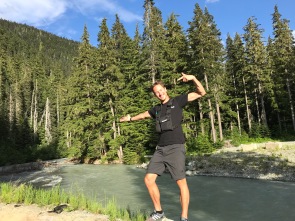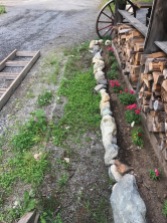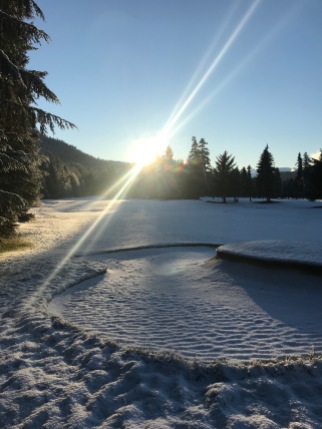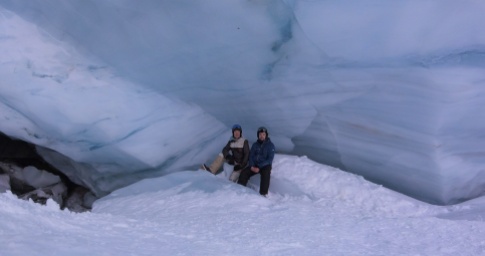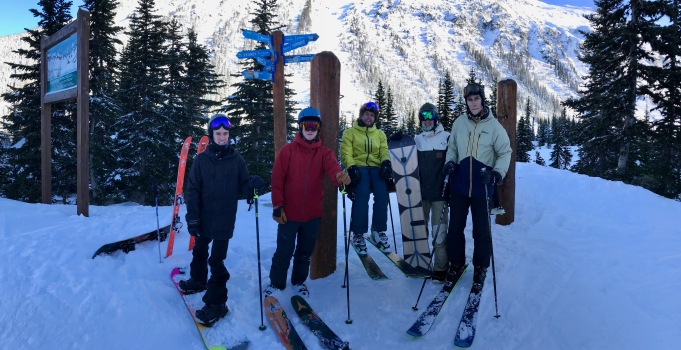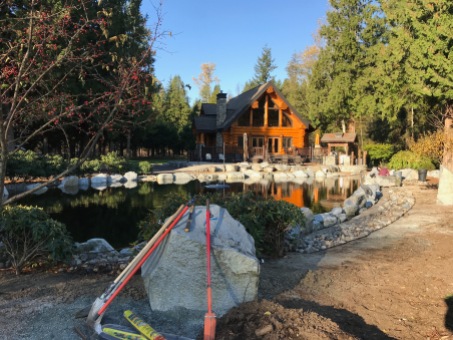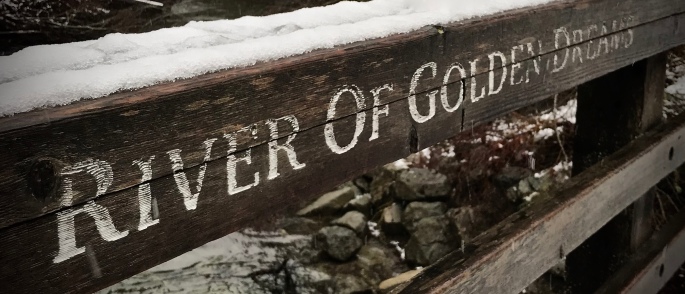Summer is over and it’s time to draw this chapter to a close. After Winter 2017/2018 at the Tube Park I needed to progress into a job that would enable me to grow, something more than just to get by. I considered trail building at the WB Bike Park, I considered being a WB Bike Park Instructor. However I was after somewhere where I could learn, improve my skill set and engage more on multiple levels. I bounced the idea off close friends, one in particular said “Kyle – have you considered becoming a guide at Canadian Wilderness Adventures“.
Looking through all these photos it is all too easy to think, hey man that’s the best job ever! But let me tell you this gig is no easy ride. There is always more to the story than what first presents itself. Hopefully this post will help potential or aspiring new guides a little along the way, that is the intention or for the rest of you at least with a little curious bed time reading.
We started off with so many and ended with so few. You could say only the strongest survive. Maybe that was half the point. Maybe that was half the appeal. Maybe when you read past all the dazzling marketing spiel, that’s just Whistler.
In Ernst. Do you like a challenge? Can you commit?
Training – First Aid
Requirements:
- Canoe (min 40 hr first aid)
- SnowShoe (min 40 hr first aid & mandatory BC Class 4 License)
- Jeeps (min 40 hr first aid & mandatory BC Class 4 License)
- ATV/mechanized machines guide (min 80 hr first aid & asap BC Class 4 License)
Level 3 certification is required for the first aid element: either the 110 hr Outdoor Emergency Care (OEC) (only really needed if you are also considering ski patrol) or the 80 hr Wilderness First Responder (WFR).
Whistler can be a struggle enough, especially with transport so keep life simple, keep it local. I went for the Wilderness First Responder 80 hr course with Sirius, André led the way, top guy! I felt this was the best fit to me, present and future.
Training companies operating in Whistler:
- Sirius Wilderness Medicine https://www.siriusmed.com WFR 80 hr $850
- Whistler Adventure School https://whistleradventureschool.com WFR 80 hr $1000
- Pacific Alpine Institute www.pacificalpineinstitute.com OEC 110 hr $1075
Training – BC Class 4 Drivers License aka the holy grail
A Class 4 License is not officially required to be a guide, although really, well it is. Get it.
Top Tip: get your BC Class 4 drivers license as soon as you can. The admin and work it will take will surprise you so get on it asap!
Why? Apart from Canoe guides where there is always a canoe shuttle driver present you will need your Class 4-unrestricted License to give you the legal capacity to pick up and return guests from the village to base. That is a core responsibility of the guides, it puts you up a pay a bracket and it puts you a step up on the all important schedule = more work = more pay = rent gets paid.
Sorry to say, but this is a process, mentally prepare for it so you don’t get the wind knocked out of your sails, especially if you are not from North America (majority of young workers in Whistler). The process is stuck in the Stone Age, it took me 5 months, no joke. Try and be patient and go with it. Seek guidance from your fellow guides, we will help, we’ve all been through the pain and all have some good advice to pass on.
So first thing first. Check out the Class 4 requirements: https://www.icbc.com/driver-licensing/types-licences/Pages/Get-your-commercial-driver-licence.aspx
Then visit your local ICBC office:
- ICBC Whistler: https://goo.gl/maps/5YjqFWjSmfE2
- ICBC Nesters: https://goo.gl/maps/VfTjs5dP3Y52
- ICBC Pemberton: https://goo.gl/maps/9qsNpvxvBDw
Get your paper work in order from your home country. This will take 2-3 weeks.
Paperwork processing Canada side will take 4-8 weeks. No they will not accept electronic confirmation. When your home country sends the letter do not open it. An opened envelope will render the mail invalid, yes seriously!
Pass your theory test. $15 a pop (for me the hard part)
Top Tip: read the book. I skim-read it. Error! That won’t work. You need to photographic memory the living hahula out of this thing. Like cover to cover. Because of questions no many years of driving experience will prepare you for. My favourite “when you use your high beam lights at night, you must switch them to low beam when a vehicle approaching is within at least ……. meters. 200 m, 250 m, 150 m or 100 m?” Whoever decided an exact distance should be measured and then recalled by drivers, driving at night and then thought it valuable enough to put in what is considered a high level test is beyond me.
https://www.icbc.com/driver-licensing/Documents/drive_commercial_veh_full.pdf
Also try out the various on-line tests:
- http://www.yourlibrary.ca/driving/
- https://practicetest.icbc.com/#/
- https://tests.ca/british-columbia/icbc-knowledge-test-practice/
Book your practical test: wait 4 weeks or so for a slot to open (options also in Squamish, Vanc)
Pass your pre-trip and practical test. $45 a pop (for me the easy part)
Top Tip: 1 (pre-trip) show the examiner that you check the function of your own seat belt as well as those of your passengers (easy to forget). 2 (practical) if you are asked what you should do after you have let off your passengers and take some time out before setting off with a set of new passengers. Answer: get out and walk around your bus to ensure there are no new obstructions, e.g. kids, especially kids.
Pass your medical (you have 45 days to complete and submit it from receiving the form) I did mine a few weeks before my practical so once I passed the practical I was good to go!: $125 for what is essentially not much more than an eye test.
Additional paper work processing fee: $40
You are likely looking at roughly $200+ for this fun time ride.
Good news! Smile nicely and Canadian will reimburse some of your Class 4 fees so KEEP YOUR RECEIPTS.
ATV & Buggy Guiding
For the majority it’s the machines that most guides will go for. It provides the thrill and the cool factor, but is also potentially the most dangerous so it takes the most training and time to get signed off on.
Top Tip: tail tail tail. Every spare day you have, jump on a machine with the current guides, listen, watch and learn. No guide is the same and often no way is the right way, different styles, different strengths and weaknesses, different ways of doing things. The core however is the same, learn this and keep it safe. The more often you do this the better chance you give yourself of getting signed off. Sign off = work = rent gets paid
Top Tip: know the terrain. Go out on your own or with fellow colleagues, drive, get used to the trails, look out and take note of your hazard call out points, draw your own map, write down the trail names. Know it, before you guide it or as some will say ‘ride before you guide’.
Top Tip: don’t break yourself, if you do, do it so you can at least still drive a Jeep one handed, ey boys. No work = no pay = *$%@ rent
Top Tip: don’t get sick. Same formula = no work = no pay = *$%@ landlord
Top Tip: there is no tip about tips, because well I guess there is no recognized internationally understood standard about how and when to tip. Some guides will believe they have a knack, a trick. In my experience it totally depends on the guest and not necessarily the guide. Hot topic? Maybe. Top Tip: always maintain a top level of service, look after your customers, be curteous, maintain the balance between safety and fun. Add value in your own way. It may be additional information regarding flora and fauna, local knowledge on where to go, where to eat, other interesting activities to do, local history, fun play list on the Jeeps or for some just cracking out their arsenal of jokes. Actually it’s all about the jokes, just tell jokes.
10-40: Not sure I should write this as a tip, but Top Tip: don’t have a 10-40 (emergency accident). Most of the time it will not matter how good a guide you are, shit will hit the fan at some point. For me luckily not this season. For the most part there is nothing you can do and it’s no ones fault, accidents happen so do your best to limit whatever it is that could happen from happening. Key: Have fun – Keep it safe. As a qualified guide you are trained to deal with situations if they happen, keep your head, remember your training, radio in your team. There are a lot of experienced and capable colleagues ready to help. Remember key: make safe, stabilize, extract, 1 hr golden window.
Canoe Guiding
Perhaps my favourite and also most difficult of the guiding jobs. Away form the noise and fumes of the machines canoe guiding gives you the opportunity to escape back into nature and really connect with your customers. With this tour I feel you have to guide the most. I don’t mean just chatting along and telling stories with the parents or singing along with the kids, yes that is part of it, but it is one size fits all with this tour so customer ability can swing in polar opposites. You can quite easily go from leading from the front/mid pack in a morning session to transferring guests and towing the back canoe along in the afternoon. Out of all the tours I found this was the one where you had to teach the most. Not just in the pre-trip safety speech, but throughout the tour. Here helping customers overcome their fears, building confidence and developing communication skills was just as important as having fun.
Conditions vary too. Some days it will be onto a smooth glassy Alta Lake as bald eagles soar above with the sun beating down as you flow into the tranquility of Lily Pad Lane before entering the gentle meanders of the River of Golden Dreams. Other days it will be battling against the chop created by a stubborn head wind, hugging the shore line for shelter before trying to escape the flesh eating branches of a swollen, fresh snow melt river of golden dreams.
The work is physical. I personally like that aspect. The canoeing itself will provide you with a good arm and core workout. You’ll need a strong back to lift the canoes in and out of the water, portaging and then lifting them on and off the trailer. Top Tip: If you have a bad back skip this one. If not persevere, you’ll get strong quick.
MTB e-bike Guiding
Much like canoe guiding the MTB-ebike tours gave me the opportunity to mix it up a little and add variety to my week. The tours give you and the customer the chance to explore the old growth forests trails with trees over a thousand years old whilst reconnecting with nature and tails of the first settlers of the 1900’s. Depending on ability you can tailor fit the tour to the group, either as a gentle scenic ride or spice it up with hitting some soft features and flowing through the berms on the way down. Both work equally well.
Good resource article: http://hikeinwhistler.com/index.php/whistler-hiking-trails/callaghan-lake
Other
In quiet season or when you are struggling to get out on tour for whatever reason, fill your time, get paid and get your hands dirty. Trail work, landscaping, or just stacking wood, take what you can and always try to be the yes man.
The Staff Party
The CWA staff parties are known to be legendary in Whistler. no photos here, soon enough you’ll get to hear the stories.
Best work/life hack
TOFU: Take Ownership, Follow Up. See-it fix-it, pick it up, shut it, help it, report it.
Company Background
This article from the local Pique Newspaper says it better than I ever could. read on:
https://www.piquenewsmagazine.com/whistler/a-quarter-century-of-good-times/Content?oid=11629403
Summery
So in essence when the operations manager Josh Livermore wrote to me before I took on the job “this is understandably a serious commitment, so please look into whether it’s the right fit for you” he was right. It is. It is also a process. A process that some will give up on, but for those that stick with it, for now at least I can in all honesty say this was one of those jobs that just got better and better with time! Thanks guys we made it! #canadian01
Now. Bring on Winter!!
































